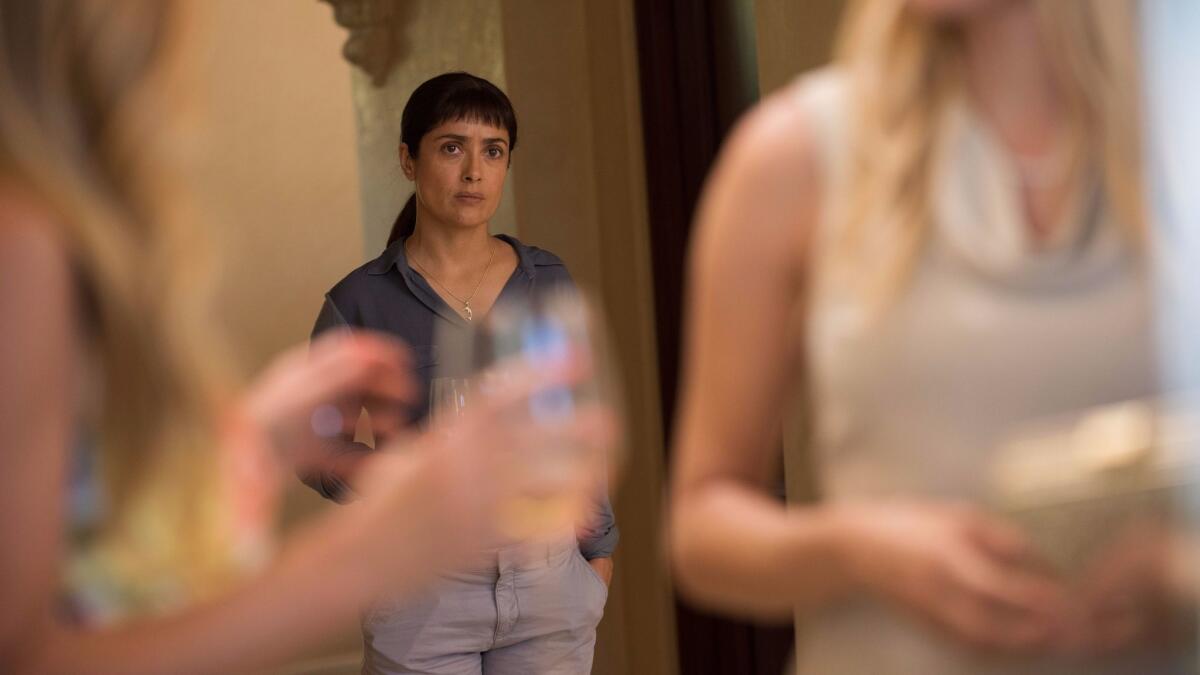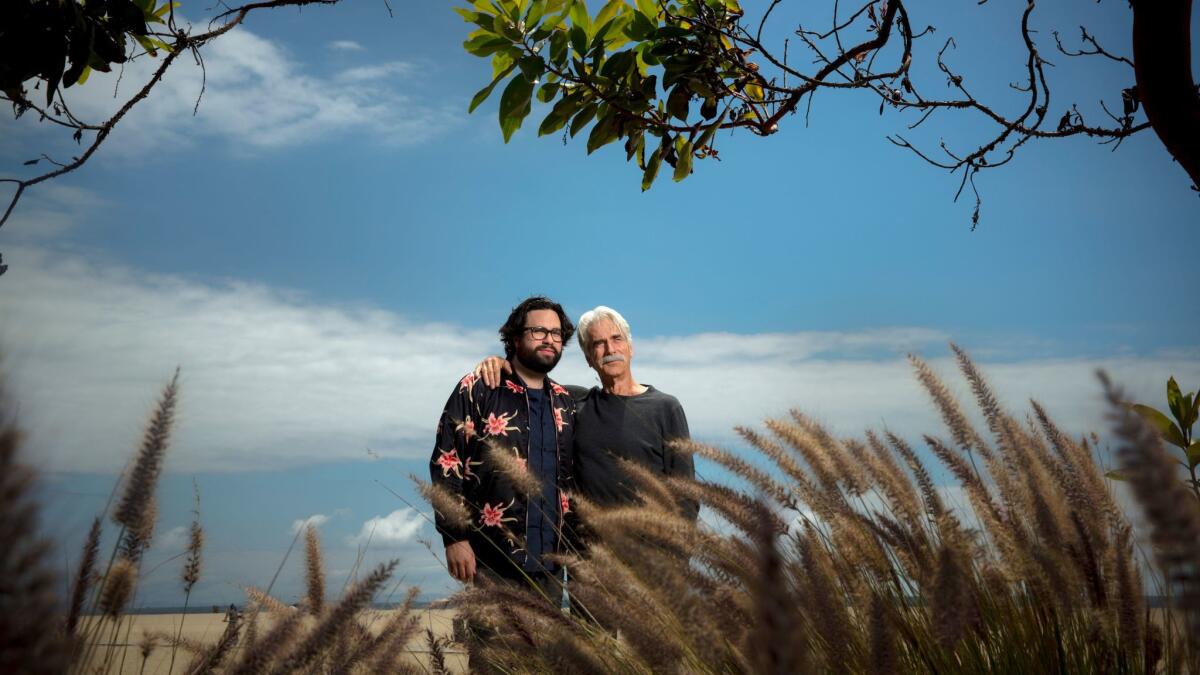Indie Focus: Politeness steps aside in ‘Beatriz at Dinner’ and ‘It Comes at Night’
- Share via
Hello! I’m Mark Olsen, and welcome to another edition of your regular field guide to a world of Only Good Movies.
The esteemed critics Manohla Dargis and A.O. Scott at the New York Times published a list of the 25 best films of the century so far. It should be no surprise that the list is a sharp, eclectic collection of films from around the world that includes “There Will Be Blood,” “Spirited Away,” “Million Dollar Baby,” “A Touch of Sin” and “The Death of Mr. Lazarescu.” (I was personally excited to see Olivier Assayas’ “Summer Hours” at No. 9.) There’s also a list of favorite films from directors such as Sofia Coppola and Alex Gibney.
As if to further prove the point of our recent article on the vibrancy of the repertory cinema scene in Los Angeles right now, the UCLA Film and Television Archive has launched an extensive survey of the films of gentleman adventurer John Huston. There are his better-known films, such as “The Maltese Falcon,” “The Treasure of the Sierra Madre,” “The African Queen,” “The Misfits” and “Prizzi’s Honor,” but also exciting esoterica like “Wise Blood” and “Under the Volcano.” Pick any night in the series and you can’t go wrong.
We had a great screening event this past week with “Beatriz at Dinner” and director Miguel Arteta. (For more on the film, see below.) And this week, we are very excited to show the film “The Big Sick” followed by a very exciting Q&A with actor and co-writer Kumail Nanjiani, co-writer Emily V. Gordon and performers Zoe Kazan, Holly Hunter and Ray Romano.

‘Beatriz at Dinner’
A movie that, whether on purpose or by odd timing and happenstance, strikes right to the heart of our contemporary cultural and political divides, “Beatriz at Dinner” is a deeply felt social satire and a lament for empathy and understanding. The film, directed by Miguel Arteta and written by Mike White, concerns a woman who works as a massage therapist and spiritual healer (Salma Hayek) who finds herself as an unexpected guest at an intimate, upscale dinner party with a ruthless real estate developer (Jonathan Lithgow) and their worldviews soon clash.
Reviewing the film for The Times, Justin Chang noted, “What gives the movie its unsettling power is its ear for the rhythms and evasions of small talk — a polite, patrician language for which Beatriz has neither the aptitude nor the patience. Gently but with increasing purpose, she seizes hold of the dinner conversation and steers it in an unsettling new direction.”
The Times’ Sonaiya Kelley spoke to Hayek and Arteta about the film. Hayek noted that she appreciated the film’s nonjudgmental point of view. “Because both arguments are intelligent arguments and they make sense,” she said. “And there’s even a moment where you see that we are more similar than we think. What determines who you are is the choices you make.”
I spoke to Arteta and White ahead of the film’s premiere at Sundance in January. White noted the additional layers of meaning the movie has taken on because of current events, saying, “I do think that it has a different resonance because of the world we’re in. But everyone is going to have their opinion. It’s going to be as polarizing as the world is.”
At the New York Times, A.O. Scott wrote about the uncomfortable feelings the movie leaves a viewer with, adding “’Beatriz at Dinner’ is about unresolvable contradictions, after all, which may mean that its failures are less specific than systemic. I don’t blame Mr. White or Mr. Arteta. I blame capitalism. I blame America.”
At Vulture, Emily Yoshida noted the “enigmatic, elegiac performance” by Hayek and added that the film’s “central clash between healers and destroyers maintains its choke hold long after the credits have rolled.”
‘It Comes at Night’
The second feature from writer-director Trey Edward Shults, “It Comes at Night” is ingenious in its simplicity, as it conjures a post-apocalyptic nightmare world largely via a secluded house in the woods and a gnawing sense of unease. The film’s talented cast includes Joel Edgerton, Carmen Ejogo, Riley Keough, Christopher Abbott and Kelvin Harrison Jr.
In his review for The Times, Justin Chang calls the film “a beautiful bummer of a horror movie” while adding, “Shults avoids the conventional trap of exposition, relying instead on his striking command of the medium to evoke the inner life of a family under extraordinarily bleak circumstances.”
For the AP, Lindsey Bahr added that the film “has the title of a horror film and, at times, the mood of one, but it is far too restrained to get the juices of the genre crowd going,” while noting its power: “Even with the bare bones plot of ‘It Comes at Night,’ somehow you find yourself suspicious of even the trees by the end. No zombies required.”
At the L.A. Weekly, April Wolfe lauded the film as “a soul-crushingly dark examination of human nature amid an invisible and unnatural threat.”

‘The Hero’
In “The Hero,” Sam Elliott plays an aging actor who feels disillusioned by his lot in life. Directed and co-written by Brett Haley, the film plays with what audiences know of and expect from the actor, who has become a symbol of easy grace and cool sex appeal.
In his review for The Times, Justin Chang noted, “Haley’s movie is ultimately a feature-length valentine to his star, and as such, it’s something of a mixed blessing. … A role that fits an actor like a glove is one thing; a project that has been this painstakingly tailored to flatter him is quite another.”
The Times’ Amy Kaufman interviewed Haley and Elliott. Haley explained the inspirations for the story, noting, “To me, it was a love letter not only to Sam, but to a dying breed of actor and film in Hollywood. It’s about how we as society tend to chew up people and then spit them out when we’re tired of them.”
At Time, Stephanie Zacharek added, “You could say ‘The Hero’ looks like just another story about an older guy who gets one last chance to recharge his life, and you’d almost be right. But director Brett Haley, who co-wrote the script with Marc Basch, brings enough understated sympathy to Lee’s character to make the picture work — it throws off a gentle, sweet-spirited energy.”
‘My Cousin Rachel’
An adaptation of a story by Daphne du Maurier, “My Cousin Rachel” is written and directed by Roger Michell into a story of deceptive gentility, a complex story of duplicity masked by polite behaviors. The film stars Rachel Weisz and Sam Claflin.
In his review for The Times, Kenneth Turan noted the “intelligence, zest and craft” in Michell’s adaptation, adding that the film “comes off as remarkably modern, dealing with personal issues and power dynamics between men and women that arguably echo at least as strongly now as they did back in the day.”
At the New York Times, Manohla Dargis lauded Weisz for the way she “fluently makes Rachel into a destabilizing force, a character whose mystery can make her gracious smiles seem etched in acid. Ms. Weisz consistently pushes the movie deeper.”
Email me if you have questions, comments or suggestions, and follow me on Twitter @IndieFocus.
SIGN UP for the free Indie Focus movies newsletter »
Follow on Twitter: @IndieFocus
More to Read
Only good movies
Get the Indie Focus newsletter, Mark Olsen's weekly guide to the world of cinema.
You may occasionally receive promotional content from the Los Angeles Times.











